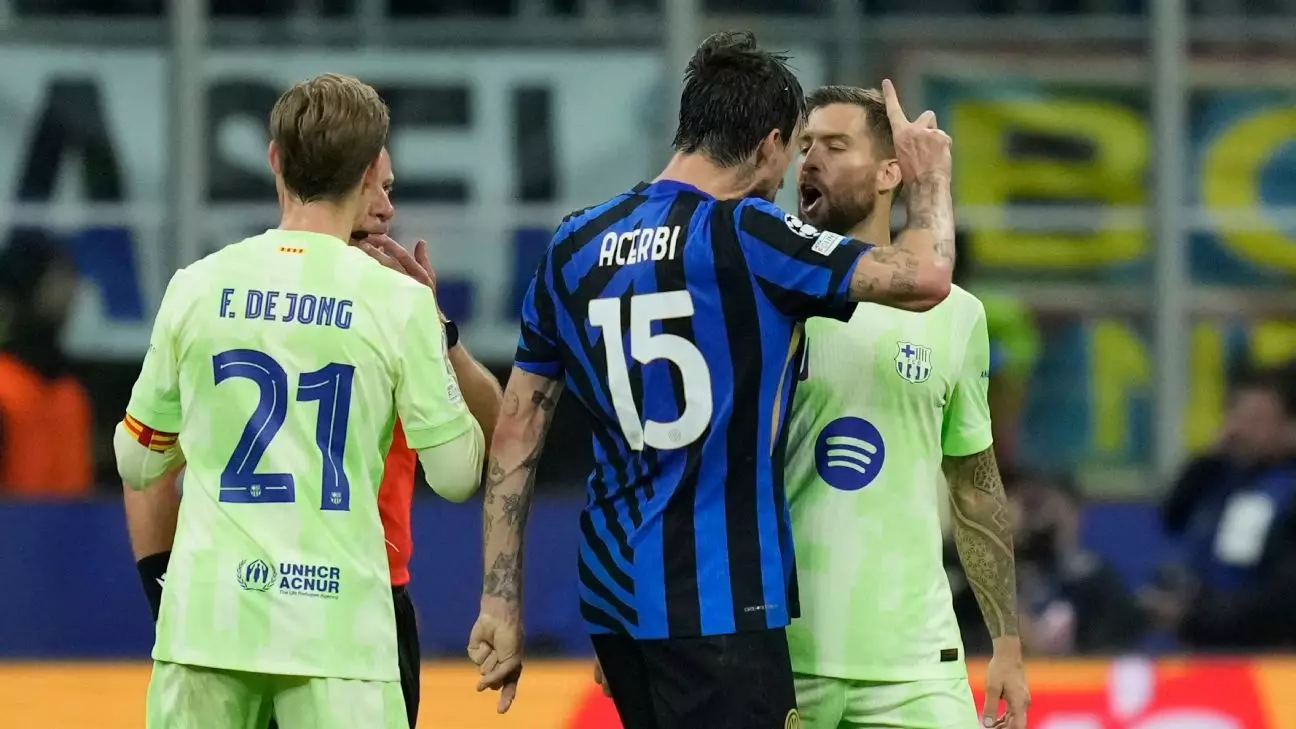In the chaotic world of football, matches often serve as battlegrounds not just for players, but for emotions and integrity. The recent Champions League semifinal tussle between FC Barcelona and Inter Milan was no exception. A clash that epitomized both the highs and lows of competitive football unfolded on that dramatic Tuesday night. Inter Milan triumphed in a thrilling 4-3 victory, but the aftermath was marred by accusations and tensions that will linger long after the final whistle.
Spitting Allegations and Heated Rivalries
At the center of this controversy was Barcelona defender Iñigo Martínez, who faced allegations of spitting at Inter’s Francesco Acerbi. This flashpoint occurred shortly after Hakan Çalhanoğlu netted a penalty, sending the Italian side into dolce far niente. As Acerbi celebrated, he reportedly taunted Martínez, igniting a fiery exchange that nearly spiraled out of control. Martínez, grappling with heated emotions, vehemently denied the spitting accusation, noting that his response, though regrettable, was not directed at Acerbi. “If I had aimed for him, I would surely have been dismissed,” he asserted, highlighting the consequences that could follow such a rash act.
As soon as the incident unfolded, Acerbi lodged a complaint with the referee, seeking intervention for what he claimed was a blatant disregard for sportsmanship. The fact that no action was taken, and that VAR was absent from the equation, has set the stage for heated debates on officiating standards in crucial matches. Martínez’s booking only added to Barcelona’s frustrations, as they had to grapple with both the emotional fallout and the referee’s decisions that night.
A Game for the Ages
Despite the controversy, the match itself was an exhilarating display of skill and resilience. Barcelona clawed their way back from a two-goal deficit to a fleeting 3-2 lead, only to be denied victory by Acerbi’s equalizer in the dying minutes of regulation. The match continued into extra time, where Davide Frattesi rallied for Inter, eventually sealing the aggregate win with a calm finish. In these moments, we were reminded why this sport captivates fans worldwide—the sheer unpredictability and raw emotion that can flip a game on its head.
Referee’s Performance Under Scrutiny
Following the match, the fallout continued with Barcelona players vocalizing their concerns over the officiating. Midfielder Pedri’s call for a UEFA investigation into the referee’s performance resonated with many, echoing the sentiments of players who felt wronged by pivotal decisions. Coach Hansi Flick’s complaints regarding so-called ‘50-50’ calls that seemingly favored Inter added to the mounting critiques of the officiating. One can’t help but ponder the implications of such disputed refereeing on the fabric of competition—when players feel their fate hangs on questionable decisions, the integrity of the sport comes into question.
As Inter Milan prepares for a final showdown, possibly against giants like Paris Saint-Germain or Arsenal, the lessons learned—about sportsmanship, officiating, and the psychological pressures of high-stakes matches—will surely echo in the minds of players and fans alike. The emotional journey of a match transcends the final score; it ripples through the competitive community, inspiring discussions around respect, accountability, and the essence of sportsmanship in the beautiful game.

